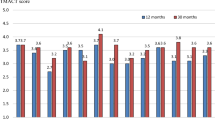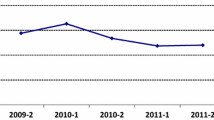Abstract
There has been increasing commentary about the degree to which Assertive Community Treatment (ACT) teams provide recovery-oriented services, often centered around the question of the use of coercion. The present study was designed to contribute to this discussion through an examination of recovery-oriented service provision and ACT fidelity among 67 teams in the province of Ontario, Canada. The findings indicated a moderate to high degree of recovery orientation in service provision, with no significant relationship between ACT fidelity and consumer and family/key support ratings of recovery orientation. A significant relationship was found, however, between the ‘nature of services’ domain of the Dartmouth Assertive Community Treatment Scale (DACTS) and ratings of recovery orientation provided by staff and ACT coordinators. These findings extend the existing dialogue regarding the evaluation of ACT intervention process factors and indicate that current measures of fidelity may not be adequately addressing dimensions of recovery-oriented service provision.
Similar content being viewed by others
References
Angell, B., Mahoney, C. A., & Martinez, N. I. (2006). Promoting treatment adherence in assertive community treatment. Social Service Review, 80, 485–526.
Anthony, W. (2004). Bridging the gap between values and practice. Psychiatric Rehabilitation Journal, 28, 105.
Bond, G. R., Drake, R. E., Mueser, K. T., & Latimer, E. (2001). Assertive community treatment for people with severe mental illness: Critical ingredients and impact on patients. Disability Management, Health Outcomes, 9, 141–159.
Bond, G. R., Drake, R. E., & Becker, D. R. (2008). An update on randomized controlled trials of evidence-based supported employment. Psychiatric Rehabilitation Journal, 31, 280–290.
Chinman, M., Allende, M., Bailey, P., Maust, J., & Davidson, L. (1999). Therapeutic agents of assertive community treatment. Psychiatric Quarterly, 70, 137–162.
Copeland, M. E. (1997). Wellness recovery action plan. Dummerston, VT: Peach Press.
Davidson, L., O’Connell, M., Tondora, J., Lawless, M., & Evans, A. C. (2005). Recovery in serious mental illness: A new wine or just a new bottle? Professional Psychology: Research and Practice, 36, 480–487.
Davidson, L., Tondora, J., O’Connell, M., Kirk, T., Rockholz, P., & Evans, A. C. (2007). Creating a recovery-oriented system of behavioural healthcare: Moving from concept to reality. Psychiatric Rehabilitation Journal, 31, 23–31.
Deegan, P. E. (2007). The lived experience of using psychiatric medication in the recovery process and a shared decision-making program to support it. Psychiatric Rehabilitation Journal, 31, 62–69.
Dixon, L., Hackman, A., & Lehman, A. (1997). Consumers as staff in assertive community treatment programs. Administration and Policy In Mental Health, 25, 199–208.
Drake, R. E., & Deegan, P. E. (2008). Are assertive community treatment and recovery compatible? Commentary on “ACT and recovery: Integrating evidence-based practice and recovery orientation on assertive community treatment teams”. Community Mental Health Journal, 44, 75–77.
Felton, B. J., Barr, A., Clark, G., & Tsemberis, S. J. (2006). ACT team members’ responses to training in recovery-oriented practices. Psychiatric Rehabilitation Journal, 30, 112–119.
Fiander, M., Burns, T., McHugo, G. J., & Drake, R. E. (2003). Assertive community treatment across the Atlantic: Comparison of model fidelity in the UK and USA. British Journal of Psychiatry, 182, 248–254.
King, R. (2006). Intensive case management: A critical re-appraisal of the scientific evidence for effectiveness. Administration and Policy In Mental Health, 33, 529–535.
Mancini, A. D., Finnerty, M. T., & Tsemberis, S. (2006). Defining intervention strategies on ACT teams and exploring correlates of their use. Paper presented at the annual meeting of the MacArthur research network on the law and mental health, Cambridge, MA.
McGrew, G. H., Wilson, R., & Bond, G. R. (2002). An exploratory study of what clients like least about assertive community treatment. Psychiatric Services, 53, 761–763.
Moser, L. L., & Bond, G. R. (2009). Scope of agency control: Assertive community treatment teams’ supervision of consumers. Psychiatric Services, vol. 60, pp. 922–928. Unpublished dissertation, Indiana University-Purdue University, Indianapolis.
Mueser, K. T., Corrigan, P. W., Hilton, D. W., Tanzman, B., Chaub, A., Gingerich, S., et al. (2002). Illness management and recovery: A review of the research. Psychiatric Services, 53, 1272–1284.
Neale, M. S., & Rosenheck, R. A. (2000). Therapeutic limit setting in an assertive community treatment program. Psychiatric Services, 51, 499–505.
O’Connell, M., Tondora, J., Croog, G., Evans, A., & Davidson, L. (2005). From rhetoric to routine: Assessing perceptions of recovery-oriented practices in a state mental health and addiction system. Psychiatric Rehabilitation Journal, 28, 378–386.
Onken, S. J., Craig, C. M., Ridgway, P., Ralph, R. O., & Cook, J. (2007). An analysis of the definitions and elements of recovery: A review of the literature. Psychiatric Rehabilitation Journal, 31, 9–22.
Salyers, M. P., & Tsemberis, S. (2007). ACT and recovery: Integrating evidence-based practice and recovery orientation on assertive community treatment teams. Community Mental Health Journal, 43, 619–641.
Salyers, M., Bond, G., Teague, G., Cox, J., Smith, M., Hicks, M., et al. (2003). Is it ACT yet? Real world examples of evaluating the degree of implementation for assertive community treatment. The Journal of Behavioural Health Services & Research, 30(3), 304–320.
Salyers, M., Tsai, J., & Stultz, T. (2007). Measuring recovery orientation in a hospital setting. Psychiatric Rehabilitation Journal, 31, 131–137.
Silverstein, S. M., & Bellack, A. S. (2008). A scientific agenda for the concept of recovery as it applies to schizophrenia. Clinical Psychology Review, 28, 1108–1124.
Solomon, P., & Stanhope, V. (2004). Recovery: Expanding the vision of evidence-based practice. Brief Treatment and Crisis Intervention, 4, 311–321.
SPSS Inc. (1998). SPSS base 8.0 for windows user’s guide. Chicago, IL: SPSS Inc.
Stanhope, V. (2007). The role of process: Examining consumer-provider service interactions. Unpublished dissertation, University of Pennsylvania.
Stein, L. I., & Test, M. A. (1980). An alternative to mental health treatment. I: Conceptual model, treatment program, and clinical evaluation. Archives of General Psychiatry, 37, 392–397.
Sylvestre, J., Nelson, G., Sabloff, A., & Peddle, S. (2007). Housing for people with serious mental illness: A comparison of values and research. American Journal of Community Psychology, 40, 125–137.
Teague, G., Bond, G., & Drake, R. (1998). Program fidelity in assertive community treatment: Development and use of a measure. American Journal of Orthopsychiatry, 68, 216–232.
Watts, J., & Priebe, S. (2002). A phenomenological account of users’ experiences of assertive community treatment. Bioethics, 16, 339–454.
Author information
Authors and Affiliations
Corresponding author
Rights and permissions
About this article
Cite this article
Kidd, S.A., George, L., O’Connell, M. et al. Fidelity and Recovery-Orientation in Assertive Community Treatment. Community Ment Health J 46, 342–350 (2010). https://doi.org/10.1007/s10597-009-9275-7
Received:
Accepted:
Published:
Issue Date:
DOI: https://doi.org/10.1007/s10597-009-9275-7




